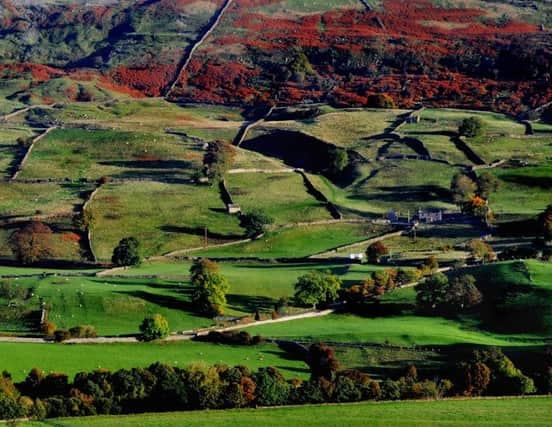Greg Wright: A failure to invest in rail is betrayal of rural businesses


In order to appreciate it, you really need to put on your boots and head to the hills.
That’s what we did last week, thanks to the Herriot Way. The way is a four-day, 52-mile walk through some of the most stunning parts of the Yorkshire Dales.
Advertisement
Hide AdAdvertisement
Hide AdIt was inspired by the works – and long-distance walks – of the famous Dales vet James Herriot, and, for a few days, it can provide city dwellers with a fleeting insight into business life in communities where the only noise at rush hour is birdsong.
A long walk certainly gives you time to observe, and ponder. The first thing that struck me was the utter folly of destroying the train services that served these parts of the Dales.
These lines were scrapped many years ago, by policymakers who lacked the imagination to foresee modern traffic congestion.
But there is no reason why rural communities should continue to pay the price for the short-sighted approach of 20th century officials.
Advertisement
Hide AdAdvertisement
Hide AdMost businesses I meet across Yorkshire worry incessantly about the lack of investment in public transport. The Yorkshire Dales should have its historic railway lines restored immediately for environmental reasons, and to ensure that local companies have access to the skilled staff they need to grow.
As we travelled on the Little White Bus, which forms the public transport lifeline between places like Hawes and the Leeds-Settle-Carlisle line station at Garsdale, I spotted what looked like the remains of a railway.
“That’s right,” said the driver, sadly. “It was dismantled years ago. If it ain’t broke don’t fix it, that’s what I’d say.”
The Settle to Carlisle Line was, of-course, only spared from closure because of a high-profile campaign by local authorities and railway enthusiasts in the 1980s.
Advertisement
Hide AdAdvertisement
Hide AdThe line to Hawes and Aysgarth was not so lucky. The incredible, heroic work of the Wensleydale Railway Association saved a 22 mile stretch of line that serves places like Northallerton West, Leyburn and Redmire. The group has the long term goal of rebuilding the line west of Redmire to Castle Bolton, Aysgarth, Hawes and eventually to Garsdale.
But why should volunteers have to battle to secure services that most people would regard as a basic right? The minibus service from Garsdale to Hawes was excellent, but how many more tourists would head to the Dales if they could hop on a train?
Reinstating a railway line is never cheap, but the long term economic and environmental benefits would be colossal. Fewer cars would clog up rural roads, and more businesses would be able to flourish because staff would be able to commute from further afield.
We should spend money today on a host of smaller railway projects, instead of placing all our faith in grand transport schemes that could be kicked into the long grass by successive Governments, or become bogged down in planning disputes. This failure to invest in rail is a betrayal of our rural communities.
Advertisement
Hide AdAdvertisement
Hide AdWhich brings me to the other thing that struck me from our trek in the Dales – the range and staying power of the independent traders who have established a base there.
Too many high streets have become the epitome of blandness, with the vast majority of shops operated by global brands.
But if you walk through the centre of Hawes, for example, you are confronted by something much more appealing – a genuinely diverse range of locally-owned businesses.
Many of them are family firms that were founded in the distant past and have seen off plenty of cycles of boom and bust.
These firms provide a towering rebuff to those who believe that, in the business world, only size matters. For true corporate wisdom, we really must lift our eyes to the hills.